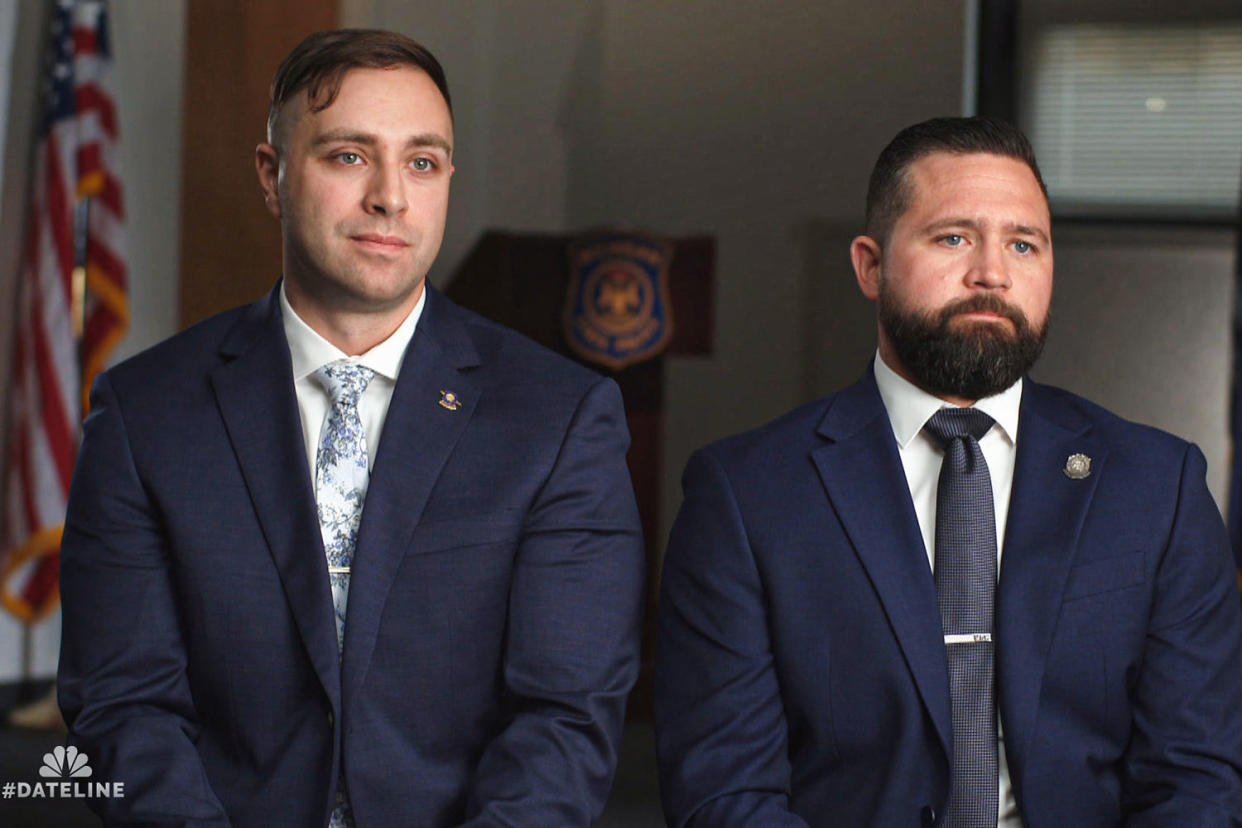Cellphone data helped solve a Michigan singer’s murder, but experts say the tool will soon be off-limits
The homicide investigation was stalled.
Police in the Michigan township of Van Buren had identified a person of interest in the 2017 killing of Egypt Covington, but by 2020, there had been no arrests. Frustrated, her brother and his now-wife began pushing local authorities to hand off the case to state investigators.
That summer, after a protest over the lack of progress and persistent advocacy from the couple, Michigan State Police took over and began unraveling the horrific mystery of who entered Covington’s home, bound her with Christmas lights and fired a single bullet into a pillow pressed against her head.
In an exclusive interview with “Dateline,” one of the state investigators who took over the case pointed to what he described as an overlooked clue that was key to solving the crime — cellphone location data gathered through an investigative technique known as a geofence warrant.
The increasingly popular and much-debated surveillance tool has allowed law enforcement agencies to gather anonymous location data for anyone whose location history is turned on — the setting is off by default — and is in a designated area during a designated time, according to Google. That area could be a one-block radius or several. Investigators use that data to unmask and track a potential suspect’s movements in or around a crime scene as the crime played out.
In Covington’s case, the data helped lead investigators to three men who pleaded guilty to second-degree murder and were sentenced to prison in October.
“That was the first piece of evidence that really broke the case wide open,” one of the investigators, James Plummer, told “Dateline.”
But a recent announcement from the main recipient of most geofence warrants, Google, has left the tool’s future in doubt — and investigators searching for their next source of data in a post-Google world. Throughout 2024, the company said in December, changes will be introduced so that users’ location data is unavailable to Google, making collaboration with law enforcement impossible.
“This is all pretty new still,” said Adam Scott Wandt, an associate professor at John Jay College of Criminal Justice who has trained law enforcement investigators across the country on the technique. “I can pretty confidently say I haven’t started lecturing or providing solutions. But I can also confidently say that we’re all talking about where to go from here.”
What may follow, warned Andrew Crocker, surveillance litigation director of the civil liberties group Electronic Frontier Foundation, could resemble the Wild West.
A reliable source for pinpointing whereabouts

Wandt wasn’t sure who first approached Google asking for user location data, but the technique offered details similar to a cell tower ping. The difference, he said, is that Google’s data — which users agree to provide when they agree to conditions of using the company’s services — appeared far more accurate.
The information was stored on a massive, internal company database known as “Sensorvault,” which made it searchable and accessible to law enforcement that obtain warrants. And the company’s products that collect such data are ubiquitous, Wandt said.
“Google is this one resource where, even if you have an iPhone, you’re gonna have a Google product,” he said.
Google has said its first requests for geofence data came in 2016. By 2020, that number had ballooned to more than 11,000. Nearly 20% of the requests sent to Google between 2018 and 2020 were from agencies in California.
Google insisted that authorities obtain a warrant if they wanted the data, and the company developed a multistep process for investigators to follow, said Andrew Guthrie Ferguson, a professor of law at American University Washington College of Law and author of “The Rise of Big Data Policing: Surveillance, Race, and the Future of Law Enforcement.”
The process begins with anonymized data and may end with an unmasked suspect, according to court records that describe the warrant process.
In Covington’s case, a detective with the Van Buren Police Department obtained data from a geofence warrant in 2020. But the agency discounted it because it came from a phone that didn’t belong to the person of interest, the state investigator said.
“They had it and they just never looked into it because they were so focused” on the wrong person, Plummer said.
Van Buren Police Chief Jason Wright said state police have told him nothing about their investigation, so he didn’t want to comment on their findings.
“They went and did their own thing,” Wright said. “They did a good job. I can’t comment on things they didn’t share with me.”
Wrong place, wrong time

Since geofence warrants require considerable manpower and analysis, they’ve often been reserved for serious crimes, Wandt said. Authorities investigating the Jan. 6 riots used geofence data, he said, and detectives investigating the killing of four Idaho college students in 2022 relied on a similar technique.
Wandt said he’s unaware of research showing how effective the tool is at solving crime, but he called it a lawful and legitimate tactic.
“A powerful technological shortcut to find unknown people by their location,” is how Ferguson described it.
But as the tool grew in popularity, so did its critics.
Civil liberties advocates described the warrants as dangerous and unconstitutional dragnets that unfairly cast everyone within the fence’s perimeter as potential criminals. They’ve pointed to innocent bystanders who’ve mistakenly been swept up in that perimeter, including a man in Florida whose exercise app placed him near a burglary and a man in Arizona wrongfully accused of murder.
“Essentially what this does, it’s a tool that just based on someone’s location, which is recorded by their phone or another device, it turns everyone in an area into a criminal suspect, just because they were in the wrong place at the wrong time,” said Chad Marlow, senior policy counsel with the American Civil Liberties Union.
Remaining under an “umbrella of criminal suspicion” is especially dangerous if the potential suspect is not white, Marlow added.
A Google spokesperson said the company has tried to protect the privacy of users “while supporting the important work of law enforcement.”
“We examine each demand for legal validity, consistent with developing case law, and we routinely push back against overbroad or otherwise inappropriate demands for user data, including objecting to some demands entirely,” the spokesperson said.
Still, lawyers and civil liberties groups challenged the technique in courts and statehouses. Bills that ban the practice in California and New York have stalled, Marlow said, but in separate criminal cases where geofence data was used to arrest suspects — one in California and another in Virginia — an appeals court and a federal judge found that the technique violated the Fourth Amendment.
In a 2023 decision, the California appeals court wrote that the warrant obtained in the case — which sought all location data for an apartment building, three gas stations, a strip mall and a bank — lacked the “particularity” required by the Constitution and was “impermissibly overbroad.”
It isn’t clear if lawyers for the men who pleaded guilty to Covington’s killing objected to the use of a geofence warrant. The attorneys did not respond to requests for comment.
A shift at Google

In December, Google announced an overhaul to its location history policy that will move users’ data from the Sensorvault to their phones. Under the new rules, if a user wants to save their location history to the cloud, the announcement says, “We’ll automatically encrypt your backed-up data so no one can read it, including Google.”
In the announcement, the company didn’t say what prompted the change, which is expected to roll out through 2024. A Google spokesperson cited privacy tools like Incognito and auto-delete and described the December announcement as part of a broader effort to give users more control over their data.
Experts said the overhaul will effectively end Google’s ability to respond to requests for location history data — a shift the Electronic Frontier Foundation, which has also backed legal and legislative challenges to the technique, described as “fantastic” news.
Ferguson described the overhaul as good for privacy and bad for police — a move that “forecloses the ability to search the entire dataset of digital signals for an unknown suspect,” he said. “Police can still confirm their suspicions if they get access to the device, but they cannot find the device or its owner with the same ease.”
Ferguson noted that many smartphone apps that aren’t owned by Google also collect user location data. But Crocker, of the Electronic Frontier Foundation, said it’s unclear if the more common ones — like Facebook or X — store that data as Google did, on a searchable, internal database. (Neither Facebook’s parent company, Meta, nor X responded to requests for comment.)
This means law enforcement agencies may turn to data brokers, or companies that buy personal information — including location data from app companies— and sell it, civil liberties advocates and law enforcement technology experts said.
Wandt said he’s already fielded requests from law enforcement personnel to help them figure out how to get this data. And some agencies have already turned to this model.
One company bought location information from data brokers and sold it via a subscription to law enforcement agencies, which it had contracts with, a 2022 investigation by The Associated Press and Electronic Frontier Foundation found. The company tracks phones through anonymous advertising IDs that authorities can potentially use to identify people’s homes and workplaces, the AP reported.
The firm declined to tell the AP how many law enforcement agencies it worked with but said it hoped to “fill a gap for underfunded and understaffed departments.”
Experts warned that there are no rules for this model, despite efforts in Congress to regulate data brokers.
“In an investigation where law enforcement wants to see location data of lots of users in a specific place, they may go to one of those data brokers and say, ‘Search your database for all the records you’ve bought from these various third parties and tell us who was there and they may do that, without a warrant at all,” Crocker said, referring to the anonymized data. “It seems to make a mockery of the Fourth Amendment.”
It’s not illegal for the government to use these services, Wandt said. “But the data broker model certainly needs federal regulation.”
Google’s requirement for a warrant was a corporate policy, not a legal mandate, Ferguson said, noting that one consequence of the company’s December announcement is that “less thoughtful actors” could become law enforcement’s go-to source for location data.
“There is nothing stopping a location tracking company from directly selling all our data to law enforcement,” he said, adding: “It is a sad commentary that privacy is more dependent on corporate tech policy than courts or legislatures.”
CLARIFICATION (March 22, 2024, 11 p.m. ET): This article has been updated to clarify that a Google user’s location history, which is off by default, must be turned on for the data to be available to law enforcement.
